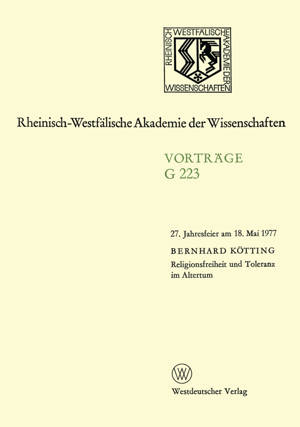
- Afhalen na 1 uur in een winkel met voorraad
- Gratis thuislevering in België vanaf € 30
- Ruim aanbod met 7 miljoen producten
- Afhalen na 1 uur in een winkel met voorraad
- Gratis thuislevering in België vanaf € 30
- Ruim aanbod met 7 miljoen producten
Zoeken
Religionsfreiheit Und Toleranz Im Altertum
27. Jahresfeier Am 18. Mai 1977 in Düsseldorf
Bernhard Kötting
€ 58,95
+ 117 punten
Omschrijving
Religious freedom is nowadays regarded as one of the normal demands of our fundamental rights. In the state system it is clected by the "ruler", who tolerates a variety of religious denominations and the association of the faithful for the purpose of joint religious worship and ceremony. On these lines "tolerance" has been in existence only since the 17th century. For the minor state of antiquity both citizenship and religious community are identical. Because the welfare of the state is dependent upon the favour of the deity or deities, the state community owes hirn or them its veneration. The individual citizen who excludes hirns elf from this threat- ens the foundations of the state and is banished; if he does not submit to this, he must forfeit his life (Socrates). If groups of "dissidents" are formed, then they must all leave the country (expulsiuns Irum Rome). vVhen, after Alexander the Great, empires embracing various peoples are formed and banishment of the "dissenters" is no longer practicable, religious philosophy offers the state the possibility of tolerance. It differentiates to the extent of a threefold manner of referring to the deity and, accordingly, of worshipping hirn. The "mythical theology" of the simple folk needs not to cause the statesman any concern as long as no state-threatening con- spiracies develop from this. The cult-hostile "philosophic theology" of a small elite hardly distresses anybody anyhow.
Specificaties
Betrokkenen
- Auteur(s):
- Uitgeverij:
Inhoud
- Aantal bladzijden:
- 54
- Taal:
- Duits
- Reeks:
- Reeksnummer:
- nr. 223
Eigenschappen
- Productcode (EAN):
- 9783531072234
- Verschijningsdatum:
- 1/01/1977
- Uitvoering:
- Paperback
- Formaat:
- Trade paperback (VS)
- Afmetingen:
- 170 mm x 244 mm
- Gewicht:
- 104 g

Alleen bij Standaard Boekhandel
+ 117 punten op je klantenkaart van Standaard Boekhandel
Beoordelingen
We publiceren alleen reviews die voldoen aan de voorwaarden voor reviews. Bekijk onze voorwaarden voor reviews.








